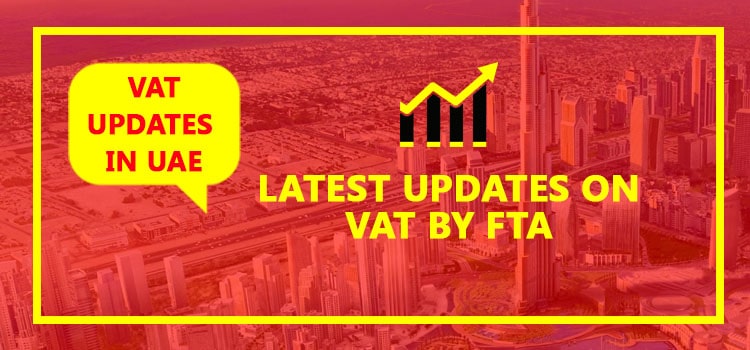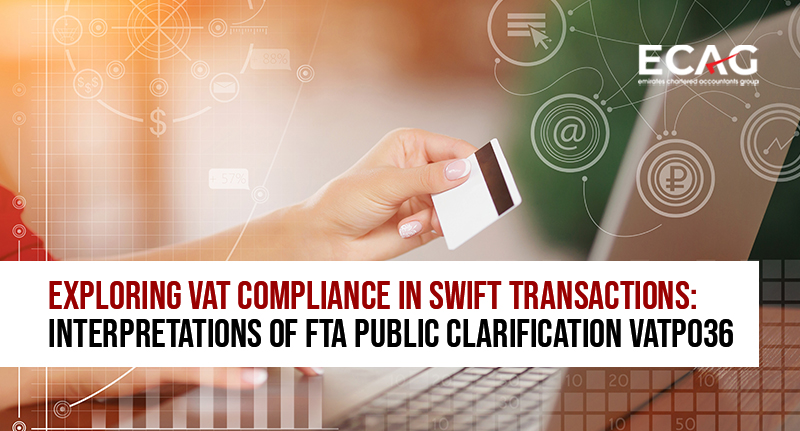
Latest Updates on VAT by FTA
Recently the Federal Tax Authority issued some guidelines on tax treatment and tax procedure for better understanding of the UAE VAT law. This blog will explain the recent amendments, clarifications and guidance on tax treatment issued by FTA which might have an impact on your business.
The recent updates are related to the following:
- Exchange Rates
- Profit Margin Scheme
- Voluntary Disclosure
- Labour Accommodation
- Director’s Services
- Non-Recoverable Input Tax – Entertainment Services
- VAT treatment of compensation-type payments
- Change in the List of Designated Zones
How to record currency Exchange Rates in your books of accounts?
Exchange Rates:
Article 69 of Federal Decree-Law No. (8) of 2017 (“VAT Decree-Law”) requires that where a supply was made in a currency other than UAE Dirham that the amount stated on the issued tax invoice should be converted into the UAE Dirham according to the exchange rate approved by the UAE Central Bank at the date of supply.
The UAE Central Bank began publishing exchange rates on 17 May 2018. Businesses are required to use UAE Central Bank rate on any tax invoice issued in a currency other than the UAE Dirham from this date onwards.
Any tax invoices issued in a foreign currency prior to 17 May 2018 should have been converted to UAE Dirham using a reliable source for exchange rates such as Oanda, Thomson Reuters, UAE Bank Rates etc.
There will be no need to rework tax invoices issued prior to 17 May 2018, provided they used exchange rate from any of the reliable source consistently.
What is the recent clarification issued on Profit Margin Scheme?
Profit Margin Scheme:
Only those goods which have previously been subject to VAT before the supply may be subject to the profit margin scheme. As a result, stock on hand of used goods which were acquired prior to the effective date of Federal Decree-Law No. (8) on Value Added Tax (“VAT law”), or which have not previously been subject to VAT for other reasons, are not eligible to be sold under the profit margin scheme.
VAT is, therefore, due on the full selling price of such goods.
When to use Voluntary Disclosure Form 211?
Voluntary Disclosure Form 211:
A Voluntary Disclosure is a form provided by the Federal Tax Authority if the Taxpayer notifies an error or omission in a Tax Return, Tax Assessment or Tax Refund application.
Voluntary Disclosure form need not be used if the underpaid tax amount is AED 10,000/- or less. It can be corrected through the Tax Return for the tax period in which the error has been discovered.
If the unpaid tax liability is more than AED 10,000/- it can be rectified using voluntary disclosure form 211.
What is the treatment of Labour Accommodation for VAT purposes?
Labour Accommodation:
Some of the labour accommodation will be treated as a supply of residential property, and some of the labour accommodation will be treated as a supply of serviced accommodation.
If the labour accommodation is considered as supply of residential property it will be treated as zero percent or exempted. If additional services are given to labour accommodation it will be treated as serviced accommodation and will be taxable at 5%.
However, the following basic services shall not be considered as part of serviced accommodation:
- cleaning of communal areas
- maintenance services required for the general upkeep of the property
- pest control
- garbage collection
- security
- utilities e.g. electricity, water, etc.
What is the taxability criteria for Director Services?
Director’s Services:
The general rule is that directors provide a service for VAT purposes to their company. As such, if the fees for services (in addition to any other supplies that might be made by the person) exceed the VAT mandatory registration threshold, namely AED 375,000, then directors are liable to register for VAT and charge VAT on the director fees. Specifically, services provided by a director should be taxable if:
- the director undertakes services on a regular, ongoing and independent basis (such as an individual who acts as an executive or non-executive director on a board or a number of different boards); and
- the total value of taxable supplies and imports made by the director, including supplies of director services, exceed the mandatory registration threshold.
A director may also choose to voluntarily register for VAT where the value of taxable supplies (including director fees) exceed the voluntary registration threshold of AED 187,500.
Which are the services in which input tax are not recoverable?
Non-Recoverable Input Tax –
Entertainment Services: VAT incurred on any costs which are used for a genuine business purpose, or which are incidental to a business purpose e.g. food and drink provided during a business meeting, shall be recoverable (subject to normal VAT recovery rules).
The food and drinks will become entertainment in nature if the purpose of attending the event is for food and drinks and hence, input tax paid on such expenses cannot be recovered.
Input tax can be claimed on hospitality expenses only if it includes the basic amenities provided to the employees. If hospitality is given for the purpose of attending events or entertainment purpose for Customers, Shareholders, Potential Customers, Officials, etc., such costs will be considered to be entertainment in nature and the VAT incurred shall not be recoverable.
What is the clarification on compensation type payments?
VAT treatment of compensation-type payments:
If payment is not a consideration for the supply, then there is no VAT due on the payment. If you have to charge VAT, there must be a supply of goods or services. If any payment does not relate to the supply of goods or services, then the payment is not subject to VAT.
Below, a few situations are mentioned where payment may or may not be treated as consideration for the supply of goods or services.
- A contractual payment to compensate for the loss
- Payment to settle a dispute
- A fine or penalty
- Payment for damaged goods
What are the recent updates with regard to Designated Zones?
Change in the List of Designated Zones -
A Designated Zone is an area specified by a Cabinet Decision as being a “Designated Zone”. Free Zones listed by the Cabinet Decision as being a Designated Zone can be found under the Legislation tab on the FTA website . Although an area might be identified as a Designated Zone, it is not automatically treated as being outside the UAE for VAT purposes. There are several main criteria which must be met in order for a Designated Zone to be treated as outside the UAE for VAT purposes.
These are as follows:
- The Designated Zone must be a specific fenced geographic area.
- The Designated Zone must have security measures and Customs controls in place to monitor the entry and exit of individuals and the movement of goods to and from the Designated Zone.
- The Designated Zone must have internal procedures regarding the method of keeping, storing and processing of goods within the Designated Zone.
- The operator of the Designated Zone must comply with the procedures set out by the FTA.
This means that where a Designated Zone has areas that meet the above requirements, and areas that do not meet the requirements, it will be treated as being outside the UAE only to the extent that the requirements are met.
Earlier twenty Free zones were categorized as Designated Zones but now it has been soared up to twenty-three Designated Zones by the Federal Tax Authority in UAE. According to the Federal Tax Authority, the newly added Designated zones are as mentioned below and has come into effect from June 18, 2018.
- Al-Ain International Airport Free Zone in Abu Dhabi
- Al Bateen Executive Airport Free Zone in Abu Dhabi
- International Humanitarian City - Jebel Ali in Dubai.
Emirates Chartered Accountants Group offers clients with a wide range of TAX Services in accordance to their business needs in Dubai, Abu Dhabi, Sharjah, Ajman, Fujairah, & Ras Al Khaimah. The Tax Team at Emirates Chartered Accountants Group are professionals with relevant industry experience hailing from different ends of the globe.
Looking for TAX Services in the UAE?
We provide:
- Tax Agent’s Service
- VAT Return Filing
- VAT Service
- VAT Registration
- Excise Tax Service
- VAT Deregistration
For Tax Services in Dubai:
Mr. Pradeep Sai
sai@emiratesca.com
+971 – 556530001
For Tax Services in Abu Dhabi:
Mr. Vinay. E. R
vinay@emiratesca.com
+971 54 378 44140
For Tax Services in Northern Emirate (Sharjah, Ajman, RAK, Fujairah)
Mr. Praveen
praveen@emiratesca.com
+971 – 508873115





